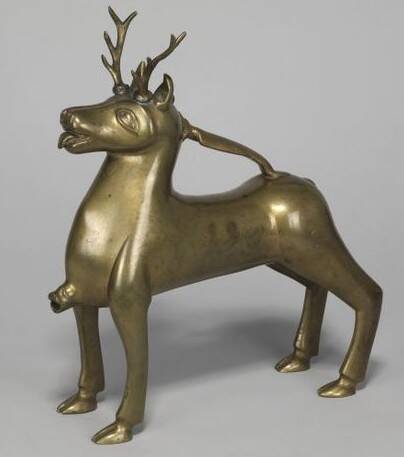Christian Andreas Schulze: «Wie der Hirsch schreiet nach frischem Wasser» - “As the hart panteth after the water brooks,” (Psalm 42) (c. 1680)

Christian Andreas Schulze
Born around 1655, presumably in Dresden-Neustadt
Died on 11 September 1699 in Meissen, Germany
Date of composition of the psalm concerto:
around 1680
Psalms, and prescribed prayers in general, are like textual spaces into which one can enter with one's own existential needs. The Hebrew Bible calls the collection of these ancient songs and prayers from the prayer tradition of the ancient Orient and the history of Israel ‘Tohillim,’ or praises, which have also become reference texts for church prayers in the European West. In these traditional texts, the person praying finds space to experience their current tears, joys and longings from a place of true inner foundation, and thus to be able to praise the foundation of their life anew with gratitude.
Psalm settings are then like sound spaces into which one can enter with one's own existential melody.
Psalm 42 is a model of how the thirst for true life and the longing to root one's own identity in another (face to face) can be expressed.
After the horrors of the Thirty Years' War (1618–1648), there was a great search for new sound spaces in which to support monodic singing. The psalm concert ‘Wie der Hirsch schreiet nach frischem Wasser’ (As the deer pants for streams of water) was probably composed in the 1680s in Meissen, where a certain Christian Andreas Schulze was city cantor. Influenced by Italian models, but deeply rooted in the German tradition of Protestant church music, Schulze succeeded in creating an expressive masterpiece and a moving psalm setting.
Listen here: 11'32
Listening companion:
Dark pedal points with concentrated dissonances, extreme for the 16th century, allow us listeners to sense the singer's current distress in the instrumental prelude. After a brief pause, the image of the thirsty deer seems to occur to him (the only psalm that begins with a comparison!), and relief seems to set in as the instruments play.
In any case, the singer finally finds the words and, in a minor key, the melody for his lament. An impressive lament figure becomes the image of the deer's cry. Several times, and also starting afresh, the singer repeats his expressive cry motif, which gives existential expression to the inner distress of his soul.
An instrumental interlude responds to the lament and brings confidence, as if from another level of knowledge of the soul: it plays calmly and solemnly the melody of the hymn, whose text reads: "I trust in my dear God / in times of fear and need. He can save me at all times / from sorrow, fear and hardship; / he can turn my misfortune around, / for everything is in his hands."
The singer continues to sing confidently, as if he has become more aware of his fundamental nature as a ‘thirsty’ person for a moment: But when will this longing be fulfilled?
Once again, the instrumental interlude responds with its chorale.
But man remains alone with his fragile, tearful existence: only a lute accompanies the intimate and vulnerable lament.
The instrumental interlude recalls for the third time the soundscape of prayer, which seeks to offer a deeper basis of trust.
The singer's coloratura still sounds deeply saddened, and the unrest can be felt expressively.
But with his ‘Harre, harre,’ the singer is focusing on new vitality, confidence and gratitude.
The modest conclusion becomes a quiet act of hope and praise: my face will find help in God's face, in my God.
.
Wie der Hirsch schreiet nach frischem Wasser
so schreit meine Seele, Gott, zu dir.
.
Meine Seele dürstet nach Gott, nach dem lebendigen Gott.
Wann werde ich dahin kommen, dass ich Gottes Angesicht schaue?
.
Meine Tränen sind meine Speise Tag und Nacht, weil man täglich zu mir sagt: Wo ist nun dein Gott?
.
Was betrübst du dich, meine Seele, und bist so unruhig in mir?
Harre auf Gott, denn ich werde ihm noch danken,
dass er meines Angesichtes Hülfe und mein Gott ist.
.
As the hart panteth after the water brooks,
so panteth my soul after thee, O God.
.